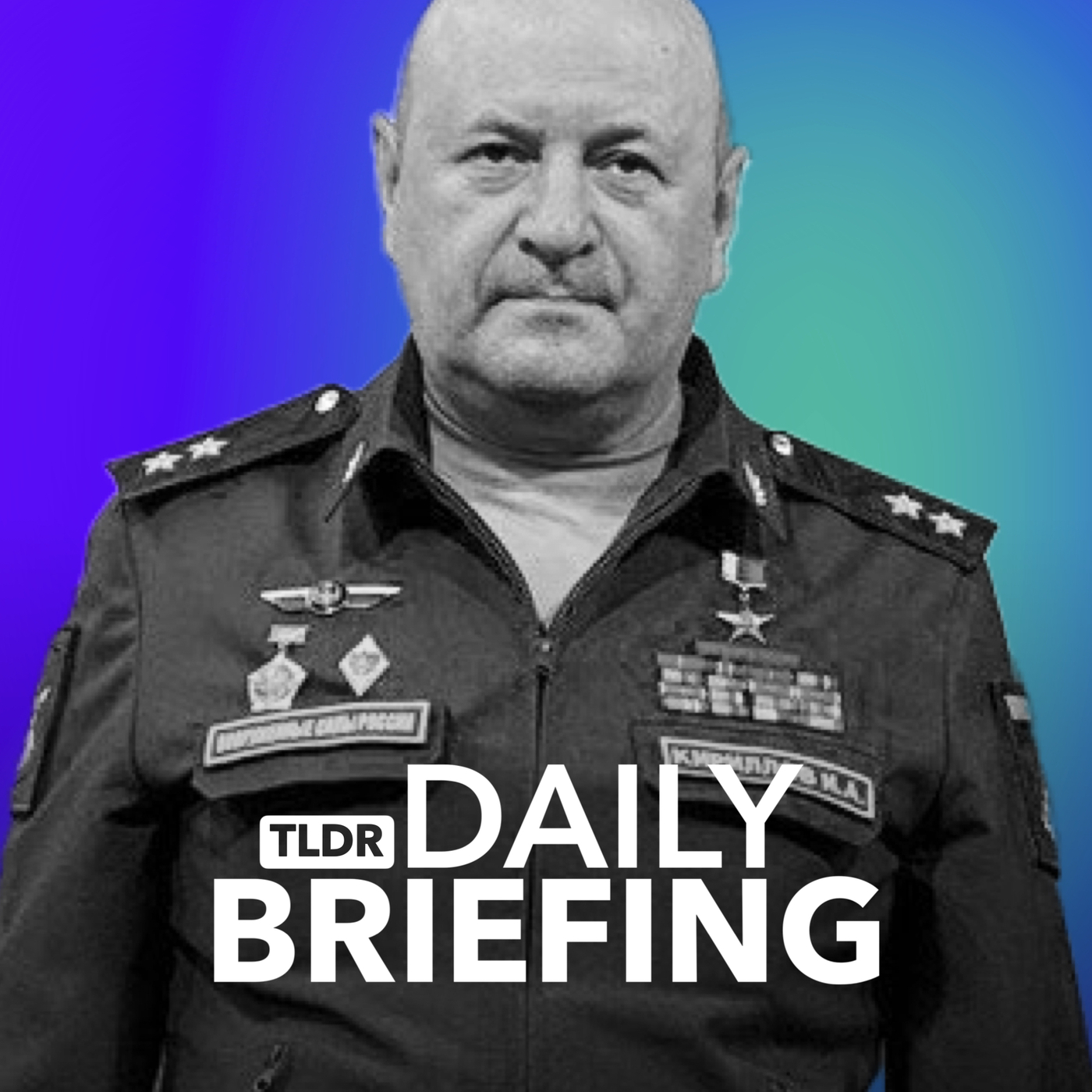
Deep Dive
Who was killed in Moscow, and what was his role?
Lieutenant General Igor Kiliov, the head of Russia's nuclear, chemical, and biological defense forces, was killed in a bomb explosion outside his home in Moscow.
What evidence suggests Ukraine's involvement in the assassination?
Ukraine's SBU security service issued a notice of suspicion accusing Kiliov of war crimes for deploying chemical weapons, and a Ukrainian intelligence official suggested his targeting was justified due to his orders to use banned substances.
What were the consequences of Kiliov's actions during the conflict?
He faced sanctions from the UK for deploying chemical weapons and was characterized as a prominent mouthpiece for Kremlin disinformation.
Why did Chrystia Freeland resign from Justin Trudeau's government?
Freeland felt she no longer had Trudeau's confidence and had been at odds with him for several weeks, particularly over managing tariff threats from the US.
What are the current political challenges facing Justin Trudeau?
Trudeau faces calls for his resignation, with nearly 40% of his Liberal Party MPs indicating they will sign a letter calling for his resignation. His approval ratings are at one of the lowest points since he took office.
What did Bashar al-Assad reveal in his first statement since the fall of his regime?
Assad claimed he intended to continue fighting against rebel forces and denied seeking refuge, stating he was evacuated by Russian forces after an attack on the airbase where he was staying.
What is the current state of Argentina's economy?
Argentina's GDP grew by 3.9% between July and September, marking the first growth since entering a recession in 2023. However, the economy is still expected to decline by 3% in 2024 before growing by 5.2% in 2025.
What challenges remain for Argentina's President Javier Millet?
Millet needs to lift capital and currency controls to attract foreign investment and allow the central bank to build up currency reserves, which are currently deterring investment.
Shownotes Transcript
Today, the head of Russia's nuclear forces is killed in Moscow, Canada's Prime Minister Justin Trudeau faces calls for resignation, and ousted Syrian leader Bashar al-Assad finally breaks his silence. From TLDR News, this is your daily briefing for Tuesday 17th December 2024. Our main story today comes from Russia, where a top Russian general has been killed in Moscow following a bomb explosion.
While Ukraine's security services are largely suspected to be behind the attack, no one has yet claimed responsibility. Lieutenant General Igor Kiliov, the head of Russia's nuclear, chemical and biological defense forces, was killed in a bomb explosion outside his home in Moscow early this morning. The blast, attributed to explosives placed on a scooter, also claimed the life of Kiliov's assistant. Today's incident marks the highest-profile assassination of a military officer since Russia's invasion of Ukraine began in 2022.
Witnesses reported that the explosion reverberated through nearby buildings, sending shrapnel flying and shattering windows. Reports also indicate that the bomb contained between 100 and 300 grams of TNT. Russia's investigative committee found that Kiliov's assassination followed a notice of suspicion issued by Ukraine's SBU security service a day before, which accused him of war crimes for allegedly deploying chemical weapons against Ukrainian forces. But the Ukrainian government has not yet commented on the general's death.
However, a Ukrainian intelligence official suggested that targeting Kirillov was justified, citing his orders to use banned substances during the conflict, with Ukraine's SBU claiming that Russia used chemical weapons more than 4,800 times under the general's leadership. Moscow, however, denies these claims. Kirillov also faced sanctions from the UK, which were placed on him in October for his deployment of chemical weapons on the front.
The UK also characterised him as a prominent mouthpiece for Kremlin disinformation. This refers to his public briefings, where he consistently accused Kyiv of various plots, including the use of chemical weapons, the development of a nuclear dirty bomb, and even claims of spreading malaria among Russian forces using mosquitoes.
There's more on the way, but if you want more TLDR content, then check out our brand new podcast, TLDR's World Leader Leaderboard, where we discuss which heads of government are doing well and who's not doing so well. Head over to the TLDR podcast channel to watch our latest episode or search for it in your favourite podcast app. And make sure you subscribe so you never miss an episode.
Monday was an incredibly tough day for Canadian Prime Minister Justin Trudeau, after his Deputy Prime Minister and Finance Minister Chrystia Freeland suddenly resigned.
In her resignation letter posted on X, Friedland said that Trudeau had requested she resign her post as finance minister last Friday, which she seems to have taken as a slight, saying that she felt she no longer had Trudeau's confidence. She also added that she'd been at odds with Trudeau for several weeks, and seemed to imply that Trudeau could not manage the tariff threats posed by incoming US President Donald Trump. She also ended her letter ominously by saying "Our time in government will come to an end."
adding that United Canada could fight against the trade threat levied by the US. After the announcement, Canadian politicians were quick to call for Trudeau's resignation, with opposition leader Pierre Poliev saying that the government was out of control and that Trudeau must call an election. Bloc Quebecois' leader also called for Trudeau to dissolve parliament, saying that his government is over and that an election should be called in early 2025.
The only party leader who took a different approach was New Democratic Party leader Yagmeet Singh, who called for Trudeau to resign but stopped short of saying that he would vote to topple the government, noting that all options are on the table. And even within his own Liberal Party, Trudeau is supremely unpopular. A report in 60 backbench Liberal MPs, nearly 40% of the party, have indicated that they will sign a letter calling for Trudeau to resign, doubting his ability to successfully lead them into the next election.
But whether or not Trudeau actually steps down is ultimately in his hands. However, with the Liberals losing the by-election in British Columbia and flipping a seat to the Conservatives, Trudeau is at his weakest point domestically since entering office in November 2015, and has one of the lowest approval ratings anywhere in the world.
In other news, ousted Syrian leader Bashar al-Assad has broken his silence for the first time since the swift collapse of his regime a week ago. In a statement shared via the Syrian Presidency's Telegram channel, he revealed that he departed from Damascus on December 8th, just one day after anti-regime forces overtook the city, marking the end of his 24-year rule. Assad also claimed that he intended to continue fighting against rebel forces,
to, quote, carry out his duties until he was evacuated by Russian forces following an attack on the airbase where he was staying.
His whereabouts were initially unknown, until Russia said that Assad had left Syria after negotiations with rebel groups. In his statement, Assad dismissed any accusations that he wanted to step down or seek refuge during the crisis, and said that he had never sought positions for personal gain. Assad's statement has drawn skepticism, however. More than a dozen people with knowledge of Assad's position told Reuters last week that Assad had been looking for a way out of the country since at least December 2nd,
and that he had initially attempted to seek refuge in the UAE, but was refused. Moving to Argentina now, where the country's economy has seemingly emerged from a severe recession.
Between July and September, GDP increased by 3.9% compared to the previous quarter. This is the first quarter in which GDP has grown since Argentina entered a recession in late 2023. Analysts from JPMorgan expect that Argentina's economy will still decline by 3% this year, but have projected that it will grow by 5.2% in 2025.
This news will come as a welcome victory for President Javier Millet, who spent the better part of his first year in office unleashing huge spending cuts and a massive drive for deregulation. The result has seen the country's triple-digit inflation reduced and has seen Argentina's sovereign bonds climb.
That's not to say though that everything in the South American country has been rosy. Months after taking office and after embarking on his ambitious plan to cut the size of the state, the country's poverty rate soared 11 points to 53% in the first half of 2024. Additionally, there's still a lot left for Millet to do. He needs to lift Argentina's capital and currency controls, which are deterring foreign investment and preventing Argentina's central bank from building up currency reserves.
And neither of those things is going to be easy.
This is just one of many major stories going on, with 2024 marking a major year in both news and elections. In fact, with the majority of the world heading to the polls, 2024 has been a pretty unique and important year. So in the latest issue of our magazine Too Long, we discuss those elections, diving deep into the 29 biggest elections of the year, making sure that you understand what really happened, and commemorating one of the biggest years in news.
We don't just discuss elections though, we also run through China's trade issues, Biden's successes and failures, the UK's new opposition leader, and the state of the wars in Ukraine and Gaza. Plus, the fact that it's a magazine means that we're not constrained by the time limits or algorithms imposed by YouTube. Unlike fleeting news cycles or algorithmic feeds, Too Long offers thought-provoking analysis and comprehensive coverage,
that's truly worth holding. Purchasing is also a great way to support the channel. Running TLDR this year has cost just under £800,000. So if you've enjoyed our coverage in 2024, then picking up a copy of Too Long doesn't just get you high quality reporting, it also allows you to invest in independent journalism and join us in shaping the future of news. So if you're convinced, you have three more decisions to make.
Firstly, do you want a physical or a digital copy? The physical one is a high-quality 60-page perfect bound magazine, shipped right to your door. But the digital is slightly cheaper, especially if you're concerned about shipping. Your second choice is the standard or premium edition. The standard is just a copy of the magazine, while the premium issue gets you access to our behind-the-scenes monthly podcast, The Bullpen, where we break down all of the production that goes into Too Long and TLDR more generally.
as well as getting your name printed in the thank you section of the magazine.
And your final decision is if you want to subscribe. If you do, you'll get a copy of Too Long every four months, meaning that you'll never miss an issue. Plus, you'll also get 25% off every copy as long as you stay subscribed. If you can, subscribing also gives us a reliable income stream, which is super useful for us. Regardless of which option you choose, you can buy a copy right now at too-long.news or by clicking the link in the description. As always, thanks for your support and thanks for backing Too Long.
